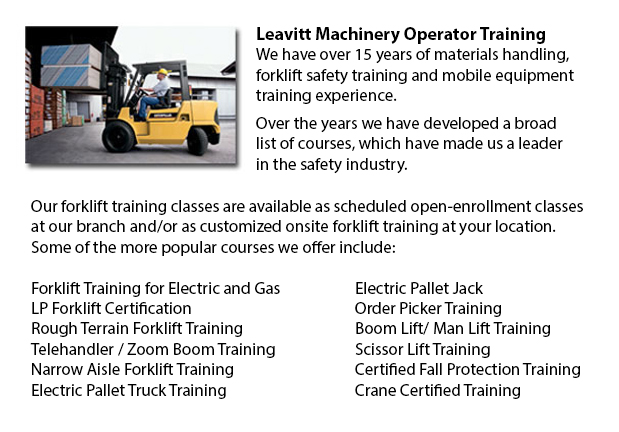
Forklift Certification Schools Langley - Within North America, forklift certification is mandatory, making forklift training programs necessary for both the company and their workers working as operators of forklifts. Forklift training focuses on safety and health issues included in using forklifts. Safety issues affect both the operator of the forklift and employees and other people who are in close proximity to the forklift. Businesses might be subject to penalties if they are caught with drivers who are un-certified during an inspection. There are numerous convincing reasons why companies must abide by forklift standards.
Before the employee or trainee is certified to operate a forklift, the majority of provincial, federal and state regulations would require the employee undergo an evaluation of the skills needed for forklift safety. There are many forklift certification schools offering courses for employees and there are likewise schools that offer on-line forklift training. Nevertheless, employers need to know that forklift certification training is not "just a test". Correct forklift training must comprise various fields of study, such as theory and hands-on practice. Rules do not need employers to have an outside organization to certify forklift drivers.
A quality forklift certification school would include a suggested program that consists of classroom training and hands-on training that is performed on-site. The training sessions within the classroom include power point presentations, videos, models and discussions. Students usually must write a test to check for subject matter understanding. Certificates of completion are given upon successful completion of the class.
The use of the equipment evaluation needs the trainee to understand the job site dangers, pre-operational machine check, a pass/fail operational test and operational instruction.
Training typically includes the following subject areas: Controls & Instrumentations; Understanding regulations and legislations; Steering and Maneuvering; Engine Operation and Maintenance; Visibility, Fork & Attachment Limitations; Stability, Rated Capacities, Inspection & Maintenance; Refueling; Load Manipulation; Hazardous Places & Rough Terrain Operations and Pedestrians. In addition, there are training courses available for workers who are transitioning to new job positions.
-
Boom Lift Certification Langley
Boom Lift Certification Langley - Making use of elevated work platforms allow for maintenance operations and work to be performed at elevated work heights which were otherwise unreachable. Boom Lift Certification Training educates workers about safel... More -
Boom Lift Training Langley
Boom Lift Training Langley - Elevated work platforms, likewise referred to as aerial platforms, enable workers to carry out tasks at heights which would otherwise be unreachable. There are various types of lifts intended for various site applications... More -
Wheel and Track Loader Training in Langley
Lift trucks are available in a variety of various units that have varying load capacities. The majority of typical lift trucks used in warehouse settings have load capacities of 1-5 tons. Larger scale models are used for heavier loads, like loading s... More -
Counterbalance Forklift License Langley
Counterbalance Forklift License Langley - When operated by completely trained operators, forklifts could become a major advantage for firms and companies. We can offer your employees a thorough training program which consists of all factors of operat... More -
Aerial Lift Ticket Langley
Aerial Lift Ticket Langley - A boom truck is frequently recognized by the cable and telephone company vans that have the elongated arm folded over their roofs. Commonly, a bucket-like apparatus sits at the extension of extendable arms. Often termed a... More -
Aerial Lift Training Langley
Aerial Lift Training Langley - An aerial work platform is a mechanized access platform. This particular device provides access to otherwise not accessible places for equipment or people. Likewise known as an aerial device or elevating work platform,... More -
Wheel Loader Operator Training Langley
Wheel Loader Operator Training Langley - To be able to raise considerable weights, industrial cranes utilize pulleys and levers. In the past, Romans utilized cranes to construct huge monuments making the origin of these equipment at least two thousan... More -
Manlift Safety Training Langley
Manlift Safety Training Langley - It is important for competent Manlift operators to be aware of the connected dangers which come with particular kinds of scissor lifts. They must be able to operate the scissor lift in a way that protects not just th... More

Forklift Training Langley
TOLL FREE: 1-888-254-6157
Langley, British Columbia
forklifttraininglangley.com
Email Us
About Us


